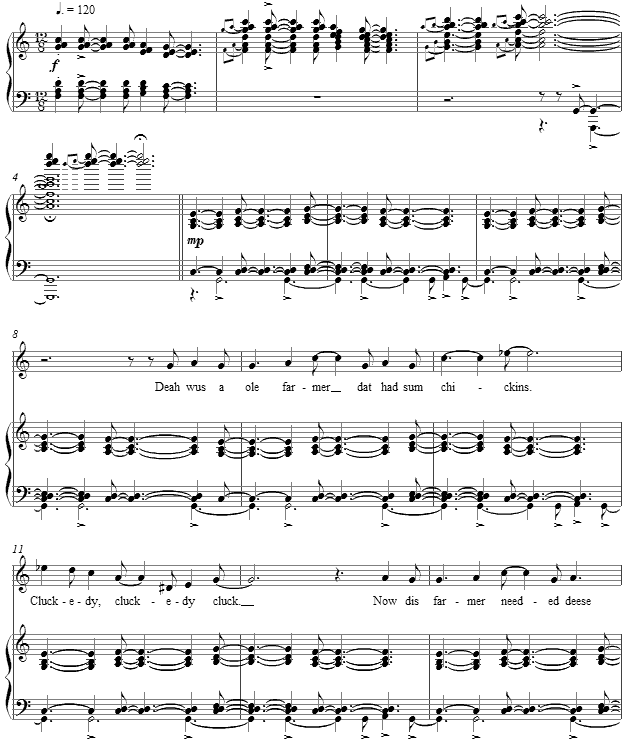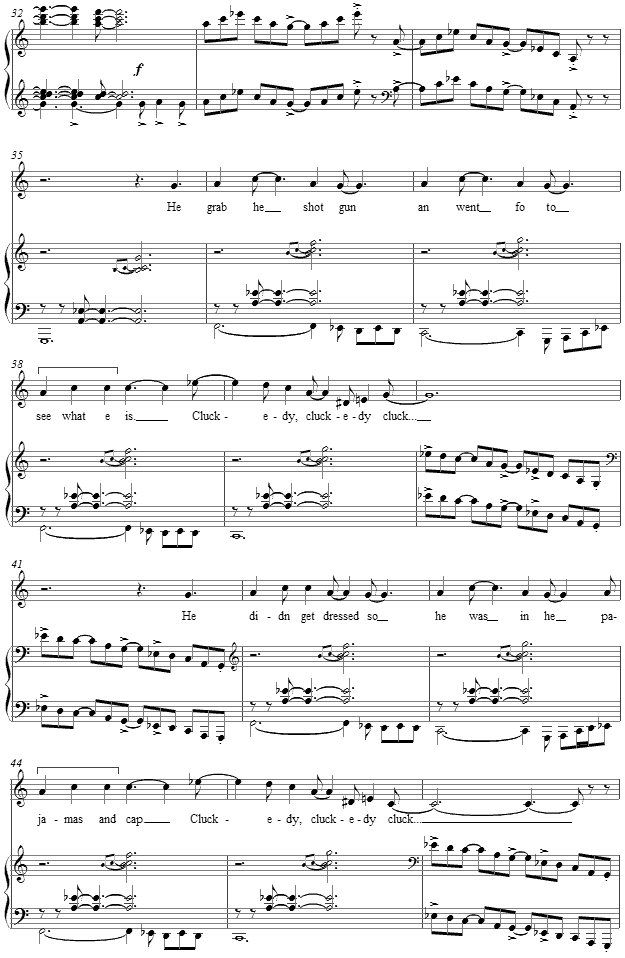Music and Texts of GARY BACHLUND
Vocal Music | Piano | Organ | Chamber Music | Orchestral | Articles and Commentary | Poems and Stories | Miscellany | FAQs
No Aigs fo Breakfast - (2008)
William Chambers Barnett II
for medium voice and piano
"This story is told as it was related by an old Gullah speaker."
Deah wus a ole farmer dat had sum chickins.
Cluck-edy, cluck-edy cluck!
Now dis farmer needed deese chickins fo to get sum aigs.
Cluck-edy, cluck-edy cluck!
One night afta he done lock up de chickins, he heard sum noise out side.
Cluck-edy, cluck-edy cluck!
He grab he shot gun an went fo to see what he is.
He didn get dressed so he wus in he pajamas an cap.
Cluck-edy, cluck-edy cluck!
He cocked de gun an snuck up to de coop.
A big dawg come up behin' an stuck he cold nose to de farmers behin'.
He gun went off.
De farmer didn et no aigs fo breakfast dat mo'nin' but he et lots of chickins.
Cluck-edy, cluck-edy cluck!
Copyright © 2008 William Chambers Barnett II All international rights reserved. Used with permission.
[ 7 pages, circa 3' 00" ]
William Chambers Barnett II
This month and year marked the eighty-fifth birthday of Bill Barnett, native of Charleston proper and now resident of James Island (Riverland Terrace) across the Ashley River from the peninsula, one time Navy salvage diver and metal smith who served in the Pacific theater during World War II, retired general foreman from the Charleston Naval Shipyards in North Charleston, church councilor for decades and one-time president in the now closed St. Andrews Lutheran Church in old Charleston and avid golfer. This year we celebrated his and Vivian Barnett's sixty-fifth anniversary.
As a youngster in South Carolina, he shared in part in the culture of the many humorous stories told in the Gullah dialect of these sea islands from South Carolina to Florida. [ 1 ] This is his retelling of one of these wonderfully droll stories, as he surprised in writing it down for me. It is a retelling of a story which he clearly recalled was told him by his boss, Mr. Paul Platt, in 1949 at the ship maintenance shop of the shipyard.
The setting begins amusingly with a syncopated snippet from a birthday song ("Down on the Farm") sung only days ago by the Barnett clan, this first gesture being "Hoorah for Billy." The setting then settles into its 12/8 phrase-and-refrain swing-time format, in which the line, "Cluck-edy, cluck-edy cluck," answers most of the lines in this prose poem. The lower third in the vocal line is major while the third in the upper octave is consistently a "bluesy" minor third.
The musical bridge leads first citations of the subdominant in succession with the tonic, all with lightly altered dominant seven chords. The last "verse" generally reprises the opening with an extended coda of "Cluck-edy, cluck-edy cluck" and the final comical statement of this tale, "no aigs fo breakfast."
The score for No Aigs fo Breakfast is available as a free PDF download, though any major commercial performance or recording of the work is prohibited without prior arrangement with the composer. Click on the graphic below for this piano-vocal score.
NOTES
[ 1 ] An anecdote, one of many, about Gullah:
"The Gullah spoken by the Edisto Island Negroes is not a written language, and there are no words to describe it; the soft voices can give it the sound of sweetest music or the guttural rumbling of a distant storm. To a person hearing it for the first time it is a foreign tongue, especially if it is spoken rapidly. Even after years of hearing it daily for months, I cannot understand it easily. A story is told that during World War II, when the Japanese were intercepting our code messages, an officer hearing one of the Edisto Island Negroes speak decided to teach him to broadcast to our armed forces. To the amazement of the Japanese there was not a person among them who could decipher the new 'code.' I do not know if the story is true, but it is perfectly plausible." In "Children of the King," Tales of Edisto, by Nell Graydon. 1955, Sandlapper Publishing, Orangeburg, S.C., p. 96.


